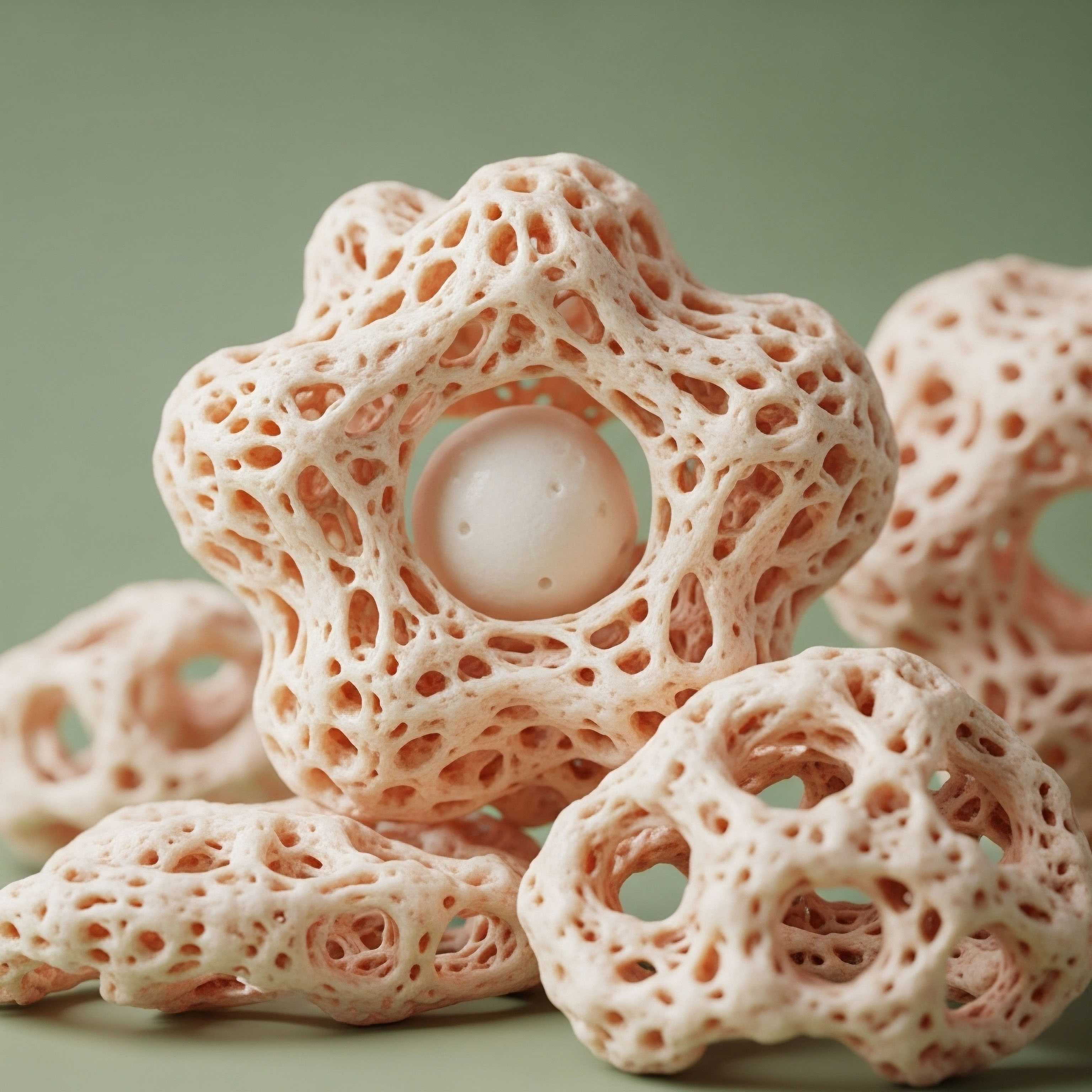

The Unseen Foundation of Dominance
In the relentless pursuit of peak performance, individuals often focus on the overt levers ∞ rigorous training, precision nutrition, and calculated supplementation. A more profound, foundational truth frequently remains underestimated. True biological supremacy stems from the depth of your rest, a deliberate, non-negotiable component of any high-achieving existence. This involves more than simply closing your eyes; it demands a strategic immersion into restorative states that recalibrate your entire operating system.
Consider the body a finely tuned instrument, capable of extraordinary output. Continuous demand without commensurate restoration leads to degradation, a slow erosion of potential. The nightly restoration cycle acts as a systemic overhaul, a period when critical biological processes execute their most vital work, preparing the organism for its next day of command.

Hormonal Rebalancing ∞ Orchestrating Internal Signals
The endocrine system, a complex network of glands and hormones, directs virtually every aspect of human function. During periods of deep, restorative rest, this system undergoes a crucial rebalancing. Growth Hormone (GH) secretion, for example, reaches its zenith during slow-wave sleep, a critical anabolic period. GH directs cellular repair, muscle protein synthesis, and fat metabolism. Insufficient rest blunts this natural surge, impairing recovery and limiting physiological adaptation.
Testosterone levels, vital for vigor, cognitive acuity, and body composition, demonstrate a clear correlation with sleep duration and quality. Chronic sleep deprivation leads to a measurable decline in circulating testosterone, directly impacting drive and physical capacity. Conversely, cortisol, the primary stress hormone, should follow a predictable diurnal rhythm, lowest during the deepest sleep phases. Disturbed sleep patterns disrupt this rhythm, maintaining elevated cortisol levels, which can drive catabolism and inflammation.
“Studies indicate that even a single week of restricted sleep (5 hours per night) can reduce circulating testosterone levels by 10-15% in healthy young men, mirroring the effects of aging by a decade.”

Metabolic Reset ∞ Fueling Cellular Efficiency
Metabolic health stands as a cornerstone of sustained performance. Deep rest plays an indispensable role in maintaining glucose sensitivity and regulating insulin response. When sleep becomes fragmented or insufficient, the body’s ability to manage blood glucose deteriorates, leading to insulin resistance. This compromises cellular energy production and promotes fat storage, directly undermining physical and cognitive output.
Furthermore, rest periods influence the activity of ghrelin and leptin, hormones that govern appetite and satiety. Adequate sleep supports a healthy balance of these signals, promoting appropriate energy intake and expenditure. Disrupted sleep skews this balance, often increasing ghrelin (hunger) and decreasing leptin (satiety), driving caloric excess and contributing to metabolic dysfunction.

Cognitive Fortification ∞ Sharpening Mental Acuity
The brain, a demanding organ, relies profoundly on sleep for its optimal function. Deep rest facilitates memory consolidation, transferring short-term memories into long-term storage. It supports neuroplasticity, the brain’s ability to reorganize and form new synaptic connections, which is fundamental for learning and skill acquisition. Decision-making, problem-solving, and emotional regulation all depend on a well-rested neural network.
Sleep deprivation impairs executive functions, leading to reduced processing speed, attentional deficits, and increased impulsivity. The brain undergoes a ‘wash cycle’ during sleep, clearing metabolic waste products that accumulate during wakefulness. This glymphatic system activity prevents the buildup of neurotoxic proteins, preserving long-term cognitive integrity.

Cellular Repair ∞ Rebuilding from Within
Every cell in the body sustains damage during daily activity. Rest offers a critical window for repair and regeneration. Processes like autophagy, where cells remove damaged components, become highly active during sleep. Protein synthesis, essential for rebuilding muscle tissue and repairing cellular structures, also intensifies.
Mitochondrial health, the engine of cellular energy, receives a vital boost from deep rest. Repair mechanisms address oxidative stress, ensuring mitochondria function at peak efficiency. This cellular renewal directly translates into improved physical stamina, faster recovery from exertion, and enhanced resilience against environmental stressors.


Precision Engineering for Restful Command
Achieving profound rest transcends passive waiting for sleep to arrive. It demands a deliberate, scientific approach to physiological and environmental conditioning. This involves understanding and manipulating the intricate systems that govern your body’s restorative processes.

Circadian Rhythm Mastery ∞ The Internal Clock Synchronization
Your internal biological clock, the circadian rhythm, dictates cycles of alertness and rest. Synchronizing this rhythm with the natural light-dark cycle represents a primary directive for deep rest. Morning light exposure, particularly within the first hour of waking, signals the brain to suppress melatonin production and initiate cortisol release, promoting wakefulness and setting the day’s rhythm. Conversely, minimizing blue light exposure in the evening hours prevents disruption of melatonin secretion, preparing the body for sleep.
Consistency in sleep and wake times, even on weekends, reinforces this internal timing mechanism. Deviations, known as social jet lag, can disrupt metabolic health and cognitive function.

Neurotransmitter Regulation ∞ The Chemistry of Calm
The delicate balance of neurotransmitters orchestrates your ability to transition into and maintain restorative sleep. Serotonin, a precursor to melatonin, plays a central role. Optimizing serotonin pathways through nutrition and targeted supplementation can enhance the body’s natural sleep-inducing chemistry. Gamma-aminobutyric acid (GABA), an inhibitory neurotransmitter, calms neural activity, reducing anxiety and facilitating relaxation.
Specific interventions support these pathways:
- Magnesium Threonate ∞ This form crosses the blood-brain barrier effectively, supporting GABAergic activity and reducing neural excitability.
- Apigenin ∞ A flavonoid found in chamomile, apigenin binds to GABA receptors, inducing a calming effect.
- L-Theanine ∞ Present in green tea, L-theanine promotes alpha brain wave activity, a state associated with relaxed alertness and preparation for sleep.
- Glycine ∞ An amino acid that acts as an inhibitory neurotransmitter, glycine improves sleep quality and reduces daytime fatigue.

Environmental Control ∞ Sculpting Your Sanctuary
The immediate sleep environment profoundly impacts rest quality. Precision in environmental control creates an optimal restorative chamber. Temperature represents a critical factor; a cooler room (typically 60-68°F or 15-20°C) facilitates the body’s natural drop in core temperature required for sleep onset and maintenance.
Light pollution, even subtle sources, interferes with melatonin production. Absolute darkness is paramount. Employ blackout curtains and eliminate all light-emitting devices. Sound dampening, through earplugs or white noise machines, mitigates auditory disruptions, allowing the brain to descend into deeper sleep stages without interruption.
“Maintaining a bedroom temperature between 60-68°F (15-20°C) consistently associates with improved sleep onset latency and increased slow-wave sleep duration, vital for physical and mental restoration.”

Advanced Modalities ∞ Data-Driven Optimization
Integrating technology for objective feedback refines your approach to rest. Heart Rate Variability (HRV) monitoring, a measure of autonomic nervous system balance, provides insights into recovery status and readiness. Consistent low HRV often signals overtraining or insufficient recovery, including sleep debt.
Wearable sleep trackers, when utilized intelligently, offer data on sleep stages, duration, and disturbances. This objective feedback allows for precise adjustments to your pre-sleep protocols and environmental settings. Cold exposure, particularly a brief cold shower or ice bath several hours before bed, can improve sleep quality by lowering core body temperature and activating the parasympathetic nervous system, promoting relaxation.


Strategic Timelines for Peak Restoration
The “when” of deeper rest extends beyond the simple act of going to bed. It encompasses a sophisticated understanding of chronobiology, pre-sleep protocols, and the consistent application of restorative practices to align your biology with your performance ambitions.

Chronotype Alignment ∞ Personalizing Your Rhythm
Individuals possess distinct chronotypes, inherent predispositions for specific sleep-wake timing. Understanding whether you function as a “lark” (early riser) or an “owl” (late riser) allows for intelligent alignment of your sleep schedule. Attempting to force a radically different chronotype creates internal friction, leading to chronic sleep debt and compromised performance. Tailoring your work schedule, exercise timing, and social engagements to respect your natural chronotype maximizes your biological advantage.

Pre-Sleep Protocols ∞ The Evening Decompression Sequence
The hours leading up to sleep represent a critical preparatory phase. A precise evening decompression sequence signals your body and mind to transition from activity to rest. The timing of your final meal significantly influences digestive processes and core body temperature. Concluding food intake at least three hours before bed supports optimal digestion and prevents metabolic interference with sleep onset.
Exercise timing also holds importance. Intense physical activity too close to bedtime can elevate core body temperature and stimulate the nervous system, hindering sleep. Scheduling vigorous workouts earlier in the day or opting for gentle movement (stretching, walking) in the evening supports a calmer physiological state. Eliminating all screen exposure (phones, tablets, computers, television) at least 60-90 minutes before sleep mitigates blue light exposure, preserving natural melatonin production.

Wake-Up Optimization ∞ Activating the Day’s Potential
The morning ritual establishes the trajectory of your day. Immediately upon waking, exposure to natural light or a bright light therapy lamp suppresses melatonin and stimulates cortisol, signaling wakefulness. Hydration, commencing with a substantial glass of water, rehydrates the body after hours of fluid restriction. Gentle movement, such as stretching or a short walk, increases blood flow and signals readiness for activity.
These deliberate morning actions reinforce your circadian rhythm and prepare your physiology for optimal function, avoiding the sluggish transition often associated with waking from inadequate rest.

Napping as a Performance Tool ∞ Strategic Interventions
Strategic napping represents a powerful, often underutilized, tool for cognitive and physical replenishment. A brief power nap, typically 20-30 minutes, can enhance alertness, improve motor performance, and reduce perceived fatigue without inducing sleep inertia. Timing remains paramount. Naps taken in the early afternoon, when the body experiences a natural dip in alertness, yield the greatest benefit. Longer naps can be restorative, but require careful integration to avoid disrupting nighttime sleep patterns.

Consistency as a Core Principle ∞ The Cumulative Effect
The true power of deeper rest emerges from unwavering consistency. Sporadic attempts at optimal sleep hygiene yield transient results. A sustained commitment to precise sleep-wake timings, meticulous environmental control, and targeted pre-sleep protocols builds cumulative restorative debt repayment. This consistent practice recalibrates your entire system, establishing a new baseline of performance, resilience, and vitality. It moves rest from a sporadic luxury to a non-negotiable, daily imperative for the high-performing individual.

Beyond Sleep ∞ The Reimagined Human Capacity
The prevailing view of sleep as a mere cessation of activity misses its profound significance. Deeper rest is an active, deliberate investment in your biological capital, a period of intensive internal work that defines your capacity for excellence. This requires a shift in perspective, recognizing rest as a fundamental pillar of performance, every bit as critical as training or nutrition.
The individual who masters this domain unlocks an inherent biological advantage, operating from a position of profound physiological resilience and sustained mental clarity.
My work with clients continually reinforces this truth. Those who commit to the science of deeper rest invariably report a dramatic increase in energy, sharper cognitive function, and an undeniable edge in their chosen fields. It stands as a testament to the body’s extraordinary capacity for self-repair and optimization, given the correct inputs and conditions. The future of human performance belongs to those who understand that true dominance begins in the quiet hours of profound restoration.



